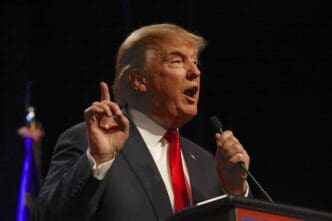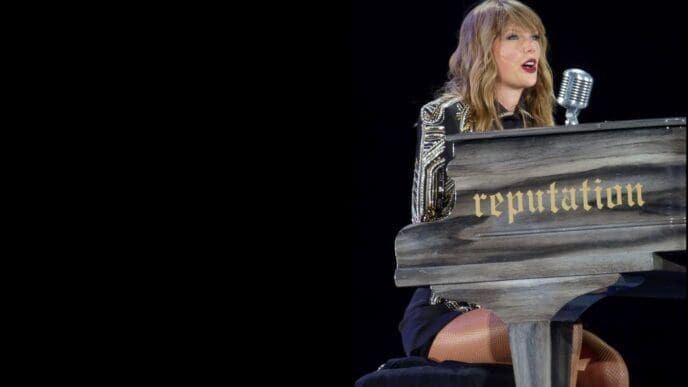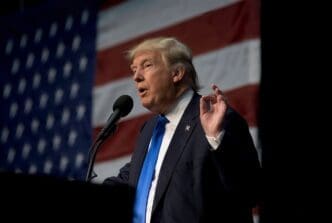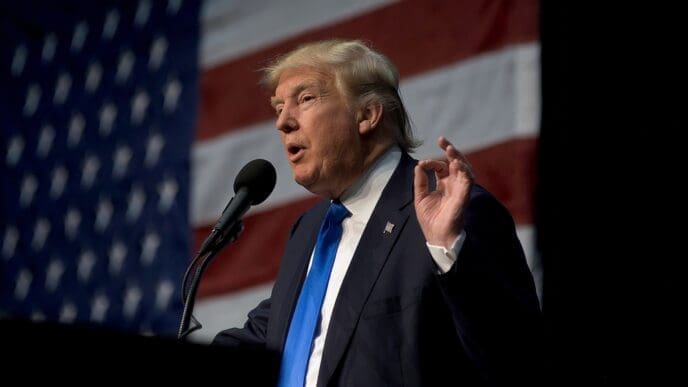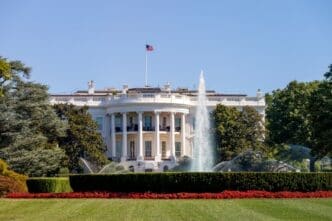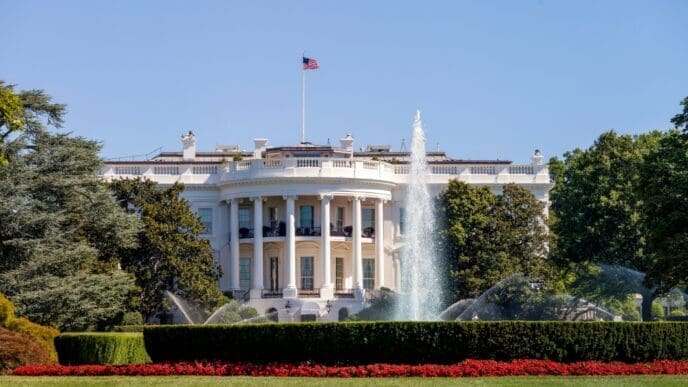Executive Summary
- Donald Trump is consistently applying his long-held philosophy of “aiming high” and “relentlessly pursuing objectives” to wield uninhibited power on the political stage.
- Trump threatened to federalize National Guard troops in Democratic-led cities like Chicago, asserting his right to intervene despite local opposition and legal questions.
- Trump announced his intent to dismiss Federal Reserve official Lisa Cook, openly linking the action to his goal of achieving significant interest rate cuts and seemingly unconcerned by potential legal challenges.
The Story So Far
- Donald Trump’s current actions, including threats to federalize National Guard troops and attempts to dismiss a Federal Reserve official, reflect his long-held “Art of the Deal” philosophy of setting ambitious goals and relentlessly pursuing them on a grander political stage. This approach is characterized by a consistent effort to expand presidential power and leverage the legal system to achieve his objectives, often by targeting perceived adversaries, with limited checks from other branches of government or his loyalist administration.
Why This Matters
- President Trump’s consistent application of his “aim high, push relentlessly” philosophy signals a determined effort to expand presidential power, evident in his threats to federalize the National Guard and attempts to dismiss Federal Reserve officials to achieve policy objectives. This approach raises significant concerns about the erosion of traditional checks and balances and the potential for the executive branch to leverage federal authority against perceived adversaries, thereby impacting the rule of law and the separation of governmental powers.
Who Thinks What?
- Donald Trump believes he has the right to exercise expansive presidential power, including federalizing National Guard troops in cities and dismissing officials like Lisa Cook, to relentlessly pursue his objectives and achieve policy goals such as interest rate cuts.
- Democratic leaders, like Illinois Governor JB Pritzker, and critics such as Senator Adam Schiff and former White House lawyer Ty Cobb, contend that Trump’s actions constitute an overreach of presidential power, lack legal justification, and are a systematic attempt to target political adversaries.
- Legal experts note that while a president can dismiss a Federal Reserve member “for cause,” the existence of sufficient cause in specific cases, such as Lisa Cook’s, presents a “closer question,” indicating legal ambiguity regarding the limits of presidential dismissal power.
Donald Trump is consistently applying his long-held philosophy of aiming high and relentlessly pursuing his objectives, now on a grander political stage, as evidenced by recent actions including threats to federalize National Guard troops in Democratic-led cities and an attempt to dismiss a Federal Reserve official.
Trump’s Enduring Philosophy of Power
Trump’s approach mirrors the philosophy outlined in his book, “The Art of the Deal,” where he articulated his strategy: “I aim very high, and then I just keep pushing and pushing and pushing to get what I’m after.” He noted that while he sometimes settles for less, he often achieves his desired outcomes.
This technique, once used for business dealings and legal disputes, is now being applied on a more consequential stage. Trump’s relentless efforts to create leverage and wield uninhibited power have been a defining characteristic of his recent actions.
Federalizing National Guard Troops
This week, Trump’s assertive push culminated in threats to federalize National Guard troops and deploy them to Chicago, despite opposition from the city’s Democratic leaders and the state of Illinois. He has also threatened to send federal forces to other cities led by Democrats.
Legal experts note that emergency conditions, such as rebellions, which might legally justify such federal intervention under the US Code, do not exist in Chicago. This stands in contrast to Trump’s claims that the city is in “big trouble” and a “disaster” due to crime.
During a Cabinet meeting, Trump asserted his perceived authority, stating, “I (have) the right to do anything that I want to do. I’m the president of the United States. If I think our country’s in danger — and it is in danger in these cities — I can do it.” Illinois Governor JB Pritzker, however, countered on X, writing, “No, Donald, you can’t do whatever you want.”
Attempted Dismissal of Federal Reserve Official
Trump is also exerting his authority on another front, announcing his intent to fire Federal Reserve official Lisa Cook. Cook is currently under investigation by the Department of Justice for alleged mortgage transgressions, which she denies, and plans to contest her dismissal in court.
The extent of Trump’s power to dismiss Cook remains unclear. Tom Dupree, a former deputy assistant attorney general, told CNN that while a president can fire a Fed member “for cause,” whether sufficient cause exists in this instance is “a closer question.”
Trump has been transparent about his motives, stating that removing Cook would likely facilitate favorable decisions on his key objective: significant interest rate cuts. He remarked, “We’ll have a majority very shortly, so that’ll be great. Once we have a majority, housing is going to swing and it’s going to be great. People are paying too high an interest rate.”
When questioned about the possibility of Cook prevailing in court, Trump appeared unconcerned, stating, “You always have legal fights. Look, I had a legal fight that went on for years with crooked people, with very horrible people.” Even if the court battle prolongs Cook’s fate, Trump may achieve his goals by exerting indirect pressure on Federal Reserve Chair Jerome Powell and making the situation difficult for Cook, whom he views as an adversary.
Leveraging Legal Delays for Political Ends
Trump has a history of utilizing the protracted nature of legal proceedings to advance his political agenda. For instance, by the time dismissed USAID bureaucrats could legally challenge him, Trump had significantly altered the agency.
During his presidential candidacy, he faced four criminal indictments and employed numerous procedural motions, often described as frivolous, to delay court actions and extend the accountability timeline concerning his alleged efforts to overturn the 2020 election. Now back in power, his administration is reportedly using the legal system to address perceived grievances.
Several individuals considered political adversaries have found themselves under investigation over mortgage filings, including California Senator Adam Schiff and New York Attorney General Letitia James, who secured a civil fraud judgment against Trump and his organization. Both deny wrongdoing and have not been charged. Similarly, FBI agents recently visited the home of John Bolton, a former National Security Advisor and frequent critic of Trump, leading to speculation about the timing of such investigations. Senator Schiff told NBC’s “Meet the Press” that Trump’s actions are “very systemic and systematic,” suggesting that “Anyone who stands up to the president, anyone who criticizes the president, anyone who says anything adverse to the president’s interests, gets the full weight of the federal government brought down on them.”
Checks on Presidential Power
While the courts have curtailed some of Trump’s policies, his numerous judicial appointments and a conservative Supreme Court majority have sometimes supported his efforts to expand presidential power, particularly with rulings on presidential immunity for official acts. Congress, another potential check, has largely been seen as acquiescent to Trump, with Republican majorities in both chambers ceding power to the executive. The ultimate constitutional safeguard, impeachment, was pursued twice by Democratic House majorities but failed to secure convictions in the Senate due due to Republican opposition.
Within Trump’s own administration, a handpicked team of loyalists is unlikely to impose restraint. During a recent Cabinet meeting, subordinates reportedly offered extensive praise to the president. Ty Cobb, a former White House lawyer during Trump’s first term, told CNN that Trump’s “sense of his own omnipotence, impunity, vengeance and ambition grows by the day.” Cobb added that “Any person who defies him is viewed not as an intellectual adversary but as a vicious opponent,” and that “Anything that he can do to wreak vengeance, obviously, makes him very happy, just like expanding his power, makes him very happy.” He urged Americans to “look at seriously because this cannot be what people in the country voted for in terms of honor, virtue and the rule of law.”
Ultimately, Trump continues to operate with a consistent strategy of setting ambitious goals and relentlessly pursuing them, signaling an ongoing effort to expand presidential authority.
